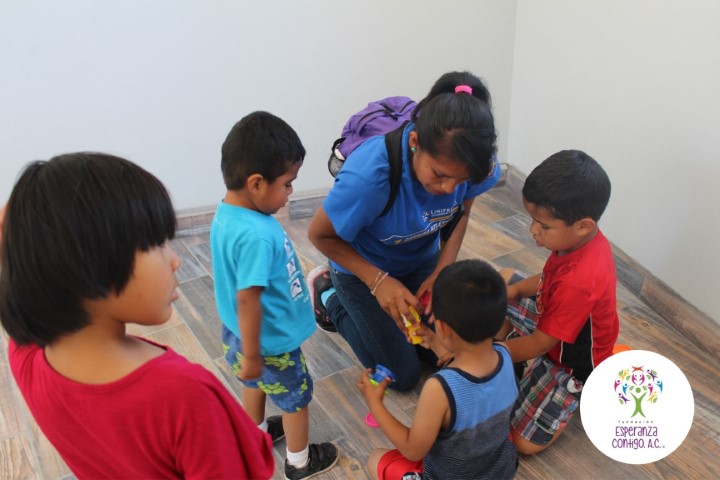Fundación Esperanza Contigo, A.C.
NEWS WITH HOPE
Help fight poverty in Mexico
Julio 15, 2021

The National Council for the Evaluation of Social Development Policy (CONEVAL for its acronym in Spanish) conducts a study on poverty in Mexico every two years, which not only measures people's income but their entire situation. It considers factors such as educational backwardness, access to health services, access to food, access to basic services, among others.
According to the most recent data, there are about 53.4 million poor people in Mexico, that is 43.6% of the population, and over 9 million people are in extreme poverty, meaning that not even all of their income is enough to satisfy at least their food needs.
Mexican children, the most affected
51% of children in Mexico live in poverty and 4 million live in extreme poverty. These are the alarming data shared by CONEVAL in 2016.
According to a study conducted by this institution and UNICEF, different factors contribute to poverty in Mexican children, among the most noteworthy are:
-Residence: the place where a child lives is a determining factor in his or her life, 46.5% of the children living in an urban population lived in poverty; on the other hand, 63.9% of the children in rural populations lived in the same situation.
-Ethnicity and disability: The situation is more difficult in Mexico when living in an indigenous household, 78.5% of indigenous children live in poverty.
The scenario is also complicated when there is a family member with a disability, in this situation 59.9% of the children live in poverty.
-Access to education: A large number of children living in poverty are forced to contribute financially to their homes, so, despite being illegal, they have to work, in these cases, it is very common for them to leave school. According to this study, 22.3% of children between the ages of 3 and 5 do not receive an education.
It is worth mentioning that, on many occasions, the children who live in orphanages in Mexico are not necessarily parentless but are children whose family situation is complicated by economic issues, violence, among others. That means that a large part of the orphanage population belongs to the groups we have just described.
How to help poverty in Mexico? The best strategy is education
Unfortunately, the quality of education in Mexico is terrible, an area that the authorities have neglected for decades. In Mexico, only 62% of the children start high school and only 45% of them finish it. 38% of men and 35% of women did not receive formal education and today are unemployed. The average education in Mexico is below that of most OECD countries.
It is important to consider that, according to the OECD, better education helps to combat social inequalities. Efforts to improve this area should focus on basic education and, above all, on the most disadvantaged sectors.
According to statistics, in 6 out of every 10 households in which a child is forced to work to contribute to his or her family, the head of the family did not attend high school. Approximately 40% of working children do not attend school, thus creating a circle in which conditions of marginalization, poverty, and exclusion are maintained, a perpetuation of poverty.
For all the above reasons, at Fundación Esperanza Contigo our answer to the question “How to help poverty in Mexico?” and specifically the children in the orphanages is getting involved in their education. Providing them with opportunities for a better future in which they can take charge of their lives and make a change.
According to UNESCO, education is the most effective way to transform lives:
- Increases job opportunities
- Reduces early births
- Educated people are more tolerant
- More equal education leads to faster growth
- Empowers women to overcome discrimination
- Reduces child marriage
“Education is indispensable in strengthening the bonds that hold communities and societies together. Education helps people understand democracy, promotes the tolerance and trust that underpin it, and motivates people to participate in politics. Education’s role is especially vital in regions and countries where lack of tolerance is associated with violence and conflict.”
At Fundación Esperanza Contigo, we have two commissions responsible for the academic development of our children and youth:
Educational Programs Commission: is in charge of analyzing, elaborating, and approving educational programs that promote the development of cognitive and digital skills of children and young people, intending to create a successful and productive life plan in which they have the tools to give themselves the future they deserve.
Mentoring and professional development commission: It aims to promote the personal and professional development of our young people. We take care of teaching them leadership and autonomy techniques with which they will develop in a better way in the working world that awaits them.
Do you want to know all our commissions and find out what each of them does?
Get involved in the development of children and young people who need it most, you can make a difference in their future by providing them with the most valuable tool they can get: education. Learn more about our donation and volunteer programs by clicking here.
Comprometidos
Con la sociedad
Gracias al apoyo de nuestros donantes, así como al esfuerzo de nuestra red de voluntarios, aliados y equipo de trabajo, hemos logrado impactar positivamente la vida de niños y jóvenes en situación de abandono en toda la ciudad.
Involúcrate